

A Brief History of the Drug War. Many currently illegal drugs, such as marijuana, opium, coca, and psychedelics have been used for thousands of years for both medical and spiritual purposes.
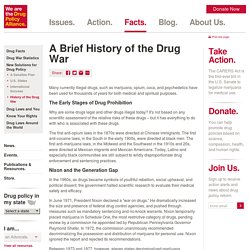
The Early Stages of Drug Prohibition Why are some drugs legal and other drugs illegal today? It's not based on any scientific assessment of the relative risks of these drugs – but it has everything to do with who is associated with these drugs. The first anti-opium laws in the 1870s were directed at Chinese immigrants. The first anti-cocaine laws, in the South in the early 1900s, were directed at black men. Nixon and the Generation Gap. Marijuana Statistics. Did you know....
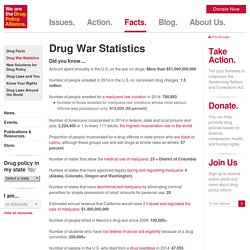
Amount spent annually in the U.S. on the war on drugs: More than $51,000,000,000 Number of people arrested in 2014 in the U.S. on nonviolent drug charges: 1.5 million Number of those arrested for marijuana law violations whose most serious offense was possession only: 619,809 (88 percent) Proportion of people incarcerated for a drug offense in state prison who are black or Latino, although these groups use and sell drugs at similar rates as whites: 57 percent. Marijuana Arrests by the Numbers. Drugs and the Brain. Introducing the Human Brain The human brain is the most complex organ in the body.
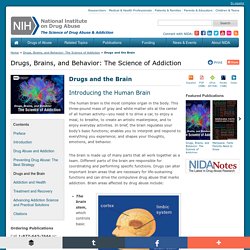
This three-pound mass of gray and white matter sits at the center of all human activity—you need it to drive a car, to enjoy a meal, to breathe, to create an artistic masterpiece, and to enjoy everyday activities. In brief, the brain regulates your body’s basic functions; enables you to interpret and respond to everything you experience; and shapes your thoughts, emotions, and behavior. The brain is made up of many parts that all work together as a team. Different parts of the brain are responsible for coordinating and performing specific functions. Trends & Statistics. Brief Description There are a variety of sources of information NIDA uses to monitor the prevalence and trends regarding drug abuse in the United States.

The resources below cover a variety of drug related issues, including information on drug usage, emergency room data, prevention and treatment programs, and other research findings. Costs of Substance Abuse Abuse of tobacco, alcohol, and illicit drugs is costly to our Nation, exacting more than $700 billion annually in costs related to crime, lost work productivity and health care. Monitoring the Future Survey (MTF) Results from a yearly survey of teenagers conducted by the University of Michigan's Institute for Social Research and funded by NIDA.
Monitoring the Future Study: Trends in Prevalence of Various Drugs Table. Marijuana: Effects, Medical Uses & Legalization. Botanical name: Cannabis sativa Other common names: weed, pot, herb, bud, dope, spliff, reefer, grass, ganja, 420, chronic, Mary Jane, gangster, boom, skunk.
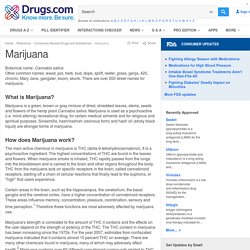
There are over 200 street names for marijuana. What is Marijuana? Marijuana is a green, brown or gray mixture of dried, shredded leaves, stems, seeds and flowers of the hemp plant Cannabis sativa. Marijuana is used as a psychoactive (i.e. mind altering) recreational drug, for certain medical ailments and for religious and spiritual purposes. Definition of gateway drug by Merriam-Webster. National Institute on Alcohol Abuse and Alcoholism (NIAAA) For more information, please visit: www.niaaa.nih.gov.
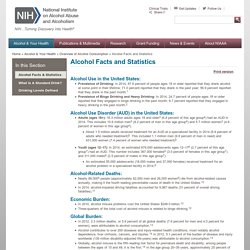
Marijuana and depression: What's the link? Drug_of_abuse. List of Commonly Used Illegal Drugs. Dr. Sanjay Gupta: Why I changed my mind on weed. Dr.
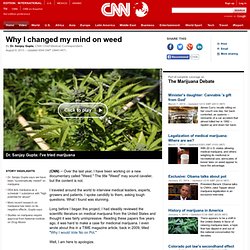
Sanjay Gupta says we have been "systematically misled" on marijuanaDEA lists marijuana as a schedule 1 substance with "high potential for abuse"Most recent research on marijuana has been on its negative effects, Gupta saysStudies on marijuana require approval from National Institute on Drug Abuse (CNN) -- Over the last year, I have been working on a new documentary called "Weed.
" The title "Weed" may sound cavalier, but the content is not. I traveled around the world to interview medical leaders, experts, growers and patients. I spoke candidly to them, asking tough questions. Long before I began this project, I had steadily reviewed the scientific literature on medical marijuana from the United States and thought it was fairly unimpressive. Well, I am here to apologize. I apologize because I didn't look hard enough, until now.
Instead, I lumped them with the high-visibility malingerers, just looking to get high. Dr. Marijuana Policy and Effects. Many opponents of medical marijuana make much of the purported link between marijuana use and mental illness.
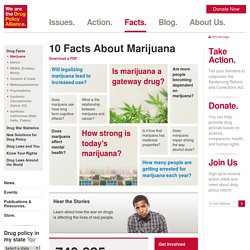
But there is simply no compelling evidence to support the claim that marijuana is a causal risk factor for developing a psychiatric disorder in otherwise healthy individuals. Most tellingly, population-level rates of schizophrenia or other psychiatric illnesses have remained flat even when marijuana use rates have increased. Emerging evidence indicates that patients who have tried marijuana may show significant improvements in symptoms and clinical outcomes (such as lower mortality rates and better cognitive functioning ) compared with those who have not. Prevention of Alzheimer's Disease Pathology by Cannabinoids: Neuroprotection Mediated by Blockade of Microglial Activation. Marijuana. What is marijuana Marijuana refers to the dried leaves, flowers, stems, and seeds from the hemp plant, Cannabis sativa.
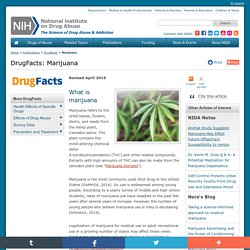
The plant contains the mind-altering chemical delta-9-tetrahydrocannabinol (THC) and other related compounds. Extracts with high amounts of THC can also be made from the cannabis plant (see "Marijuana Extracts"). Marijuana is the most commonly used illicit drug in the United States (SAMHSA, 2014). Its use is widespread among young people.
Legalization of marijuana for medical use or adult recreational use in a growing number of states may affect these views. How do people use marijuana? People smoke marijuana in hand-rolled cigarettes (joints) or in pipes or water pipes (bongs).